1980 Volkswagen Westfalia Camper, a name that evokes images of sun-drenched beaches, winding mountain roads, and the freedom of the open road. This iconic van, a symbol of the 1980s counterculture and a testament to German engineering, has captivated adventurers and dreamers for generations.
The Westfalia Camper, born from the humble Volkswagen Transporter, transformed the landscape of camping and travel, offering a unique blend of practicality, comfort, and adventure.
The 1980 Westfalia Camper wasn’t just a vehicle; it was a lifestyle. Its compact size and versatile interior allowed for exploration in style, while its pop-up roof and built-in amenities ensured a comfortable and convenient experience. From the bustling city streets to the serene wilderness, the Westfalia Camper provided a sense of independence and escape, fostering a community of passionate enthusiasts who shared a love for this classic vehicle.
History and Evolution
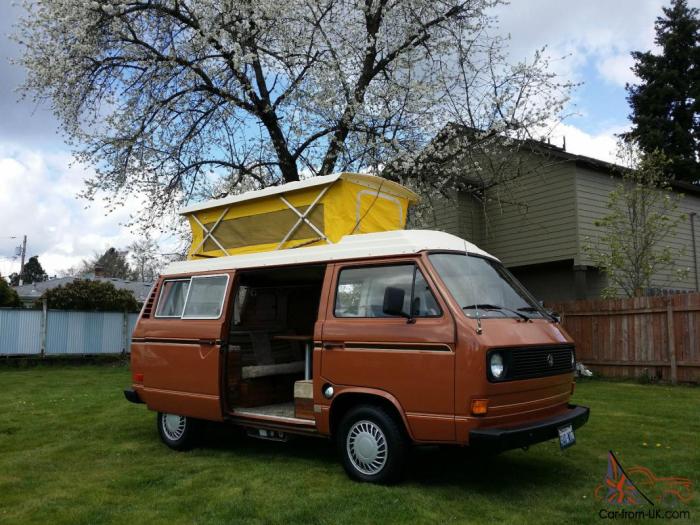
The Volkswagen Westfalia Camper, a symbol of freedom and adventure, has a rich history that spans over six decades. Its journey began with the iconic Volkswagen Transporter, a vehicle that revolutionized transportation and paved the way for the camper van phenomenon.
The 1980 Westfalia Camper represents a significant milestone in this evolution, embodying the spirit of the era and captivating the hearts of adventurers worldwide.The Westfalia Camper’s lineage can be traced back to the first Volkswagen Transporter, also known as the T1, introduced in 1950.
The 1980 Volkswagen Westfalia Camper, with its iconic pop-top roof and cozy interior, epitomized the free-spirited adventure of the era. But if you’re looking for a blast from the past with a more sleek and sophisticated edge, check out the 1988 Studebaker Avanti: A Blast From the Past.
This muscle car, with its futuristic design and powerful engine, offers a completely different kind of retro appeal. While the Westfalia is all about embracing the open road, the Avanti is a reminder that even in the 80s, style and performance could still be found in unexpected places.
This revolutionary vehicle, designed by Dutch engineer Ben Pon, was inspired by the Volkswagen Beetle’s platform and quickly gained popularity as a versatile and affordable van. Recognizing the potential of the Transporter for recreational use, Westfalia, a German company specializing in camper conversions, began modifying the vans in the late 1950s.
The 1980 Volkswagen Westfalia Camper is a timeless icon, a symbol of freedom and adventure. It’s one of those vehicles that instantly transports you back to a simpler era, a time when life was about exploration and enjoying the open road.
These classic campers are not just vehicles; they’re time capsules, carrying the spirit of a bygone era. If you’re looking to delve deeper into the world of classic cars , the Westfalia is a great place to start. Its iconic design, practicality, and undeniable charm make it a true gem in the world of classic cars.
The Rise of the Westfalia Camper
The 1980s marked a pivotal period in the history of the Westfalia Camper. The economic boom of the 1970s had given way to a period of recession and social change, prompting many people to seek simpler lifestyles and outdoor adventures.
The Westfalia Camper, with its compact size, fuel efficiency, and practical features, became an attractive option for those seeking escape and self-sufficiency. The 1980 Westfalia Camper, based on the T3 Transporter, was a testament to the ingenuity and craftsmanship of the era.
It featured a range of innovative design features that enhanced its functionality and comfort, making it a truly unique and desirable vehicle.
The 1980 Volkswagen Westfalia Camper is a symbol of freedom and adventure, offering a unique blend of practicality and charm. While the Westfalia embodies a sense of relaxed exploration, it’s interesting to contrast its functionality with the sheer opulence of a 1950 Rolls-Royce Silver Wraith: A Timeless Classic.
The Silver Wraith represents a different kind of luxury, embodying a bygone era of elegance and craftsmanship. However, both vehicles, in their own way, offer a glimpse into a specific time and a distinct experience, making them both fascinating examples of automotive history.
Driving Experience
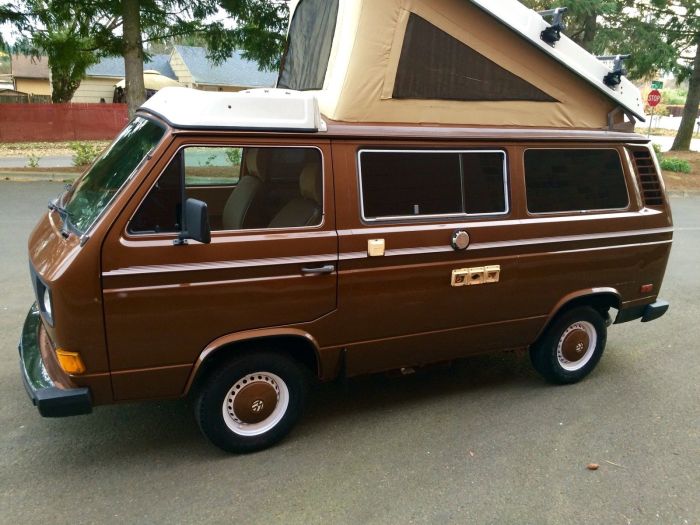
The 1980 Volkswagen Westfalia Camper, built on the iconic Type 2 chassis, offers a unique driving experience that blends practicality and nostalgia. While not known for its speed or modern amenities, its charm lies in its simplicity and ability to transport you to a different era.
Driving Characteristics
The 1980 Westfalia Camper is powered by a 1.6-liter, air-cooled, four-cylinder engine that produces around 50 horsepower. This engine provides adequate power for city driving and cruising on open roads, but acceleration is sluggish, and overtaking can require careful planning.
The handling is relatively stable, but the van’s high center of gravity and rear-wheel drive can make it feel a bit top-heavy in corners, especially when loaded. Fuel efficiency is a strong point of the Westfalia Camper. The air-cooled engine is known for its durability and fuel economy, achieving an average of 20-25 miles per gallon.
However, fuel consumption can vary depending on driving conditions and load.
Comfort and Practicality for Long-Distance Travel
While the Westfalia Camper is designed for long-distance travel, it’s important to understand its limitations. The cabin is relatively cramped, and the lack of modern amenities, such as air conditioning and power steering, can make long journeys challenging, especially in hot or humid weather.
However, the van’s spacious interior, with its fold-down bed, kitchenette, and ample storage space, provides a comfortable and practical living environment for two people.
Comparison with Contemporary Campervans
Compared to modern campervans, the 1980 Westfalia Camper lacks the amenities and performance found in newer models. Contemporary campervans often feature powerful engines, advanced safety features, and luxurious interiors. However, the Westfalia Camper offers a unique charm and simplicity that appeals to those seeking a more authentic and vintage travel experience.
Its affordability and reliability make it a popular choice for budget-conscious adventurers.
Restoration and Customization: 1980 Volkswagen Westfalia Camper
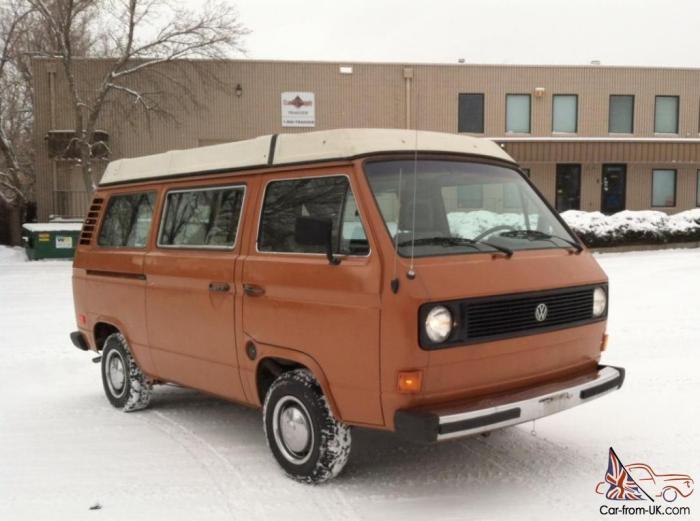
Restoring and customizing a 1980 Westfalia Camper can be a rewarding experience, allowing you to bring a classic vehicle back to life and tailor it to your specific needs and preferences. This section will explore the process of restoration, common challenges, and provide a guide for customization, including popular aftermarket upgrades and modifications.
The 1980 Volkswagen Westfalia Camper, a symbol of freedom and adventure, represents a distinct era in automotive design. While its sleek lines and practicality speak to its time, it’s fascinating to consider how vehicles like the 1927 Dodge Coupe: A Glimpse into Automotive History paved the way for such iconic designs.
The Dodge Coupe, with its vintage charm and mechanical ingenuity, demonstrates the evolution of automotive engineering. The Westfalia Camper, in its own right, stands as a testament to the enduring appeal of compact, versatile vehicles that prioritize functionality and adventure.
Restoring a 1980 Westfalia Camper, 1980 Volkswagen Westfalia Camper
Restoring a 1980 Westfalia Camper is a significant undertaking, requiring dedication, time, and a good understanding of the vehicle’s mechanics and construction. The process typically involves addressing several key areas:
- Bodywork: Rust is a common issue with older Westfalias, especially in areas prone to moisture. Repairing rust damage can involve sanding, patching, and applying primer and paint.
- Engine and Drivetrain: A thorough inspection and potential rebuild of the engine and transmission are often necessary. This may involve replacing worn parts, seals, and fluids.
- Interior: The interior of a Westfalia Camper often needs attention, including reupholstering seats, replacing worn carpets, and restoring the original cabinetry.
- Electrical System: The electrical system should be inspected and upgraded as needed. This may involve replacing old wiring, upgrading the battery, and installing new lighting.
Restoring a 1980 Westfalia Camper can be a challenging but rewarding experience. It requires patience, skill, and a commitment to detail. However, the end result is a classic vehicle that can be enjoyed for years to come.
Customizing a 1980 Westfalia Camper
Customizing a 1980 Westfalia Camper allows you to personalize the vehicle to suit your specific needs and preferences. From enhancing the interior to upgrading the performance, there are many options available.
Here are some ideas for customizing a 1980 Westfalia Camper:
- Interior Upgrades: Upgrading the interior can enhance comfort and functionality. Consider replacing the original upholstery with more modern fabrics, installing new flooring, and adding additional storage solutions.
- Exterior Modifications: Modifying the exterior can give your Westfalia a unique look. Popular options include painting the vehicle, adding a roof rack, and installing new wheels and tires.
- Performance Enhancements: Upgrading the engine and drivetrain can improve performance and fuel efficiency. Consider installing a performance exhaust, upgrading the air intake, or adding a turbocharger.
- Modern Amenities: Adding modern amenities can make your Westfalia more comfortable and convenient. Consider installing a solar panel system, a backup camera, or a navigation system.
Popular Aftermarket Upgrades and Modifications
| Upgrade/Modification | Benefits | Potential Drawbacks |
|---|---|---|
| Engine Upgrade | Increased horsepower and torque, improved acceleration and towing capacity. | Higher fuel consumption, increased maintenance costs, potential warranty issues. |
| Suspension Upgrade | Improved handling and ride comfort, increased ground clearance. | Higher cost, potential impact on ride quality, reduced fuel efficiency. |
| Solar Panel System | Provides off-grid power for appliances and electronics. | Initial investment cost, potential damage from weather conditions. |
| Backup Camera | Enhanced safety and visibility when reversing. | Installation cost, potential interference with existing electronics. |
| Navigation System | Improved navigation and route planning. | Installation cost, potential reliance on GPS signal. |
Community and Culture
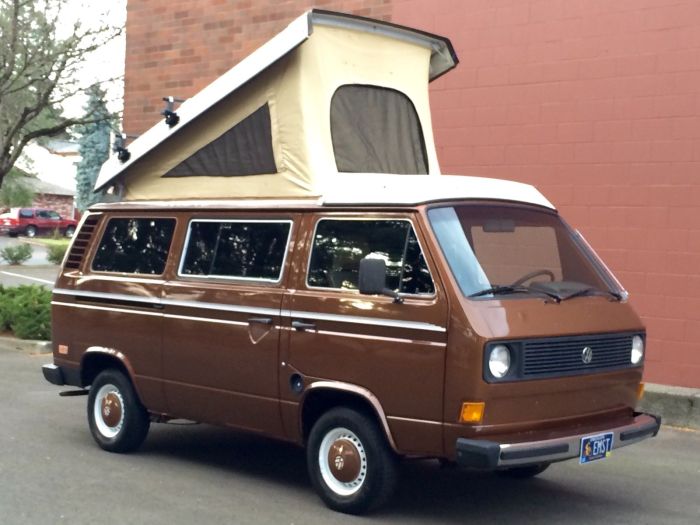
The 1980 Volkswagen Westfalia Camper is more than just a vehicle; it’s a symbol of freedom, adventure, and a vibrant community of enthusiasts who share a deep passion for these classic vehicles. The Westfalia’s unique blend of practicality and charm has captivated generations of travelers, fostering a strong sense of camaraderie among owners and a rich cultural legacy.
Cultural Significance
The 1980 Westfalia Camper occupies a significant place in the history of camping and road trips. Its compact size, versatile design, and iconic styling made it an ideal choice for families and adventurers seeking a unique and memorable way to explore the world.
The Westfalia’s popularity grew alongside the rise of the counterculture movement in the 1970s, as people sought alternative lifestyles and embraced the spirit of freedom and self-sufficiency.
Timeline of Events
The 1980 Westfalia Camper’s journey has been marked by several significant events and milestones, shaping the community and its cultural impact.
- 1951:Westfalia begins producing camper conversions for the Volkswagen Transporter, marking the birth of the iconic Westfalia Camper.
- 1970s:The rise of the counterculture movement and a growing interest in alternative lifestyles fuel the popularity of the Westfalia Camper, making it a symbol of freedom and adventure.
- 1980:The 1980 Volkswagen Westfalia Camper, with its distinctive design and features, is introduced and becomes a sought-after model for its practicality and charm.
- 1990s:The Westfalia Camper continues to be popular, but production eventually ceases as Volkswagen shifts its focus to other models.
- 2000s:The Westfalia Camper enjoys a resurgence in popularity as a classic vehicle, with a growing community of enthusiasts dedicated to preserving and restoring these iconic campers.
- Present Day:The 1980 Westfalia Camper remains a beloved vehicle, with a strong community of owners who participate in rallies, meetups, and online forums, sharing their passion and knowledge about these classic campers.
Closure
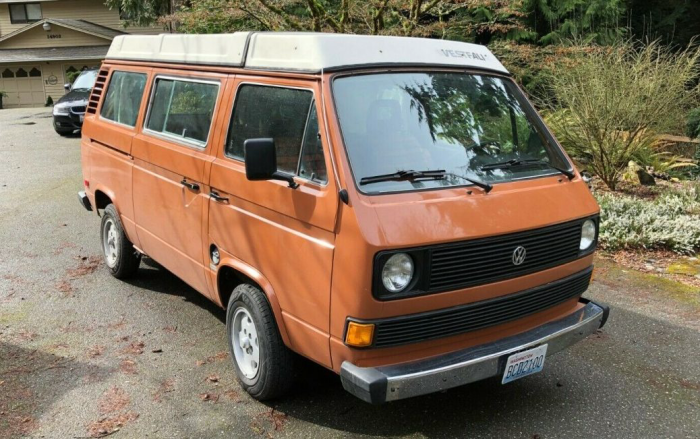
The 1980 Volkswagen Westfalia Camper remains a symbol of adventure, freedom, and a simpler time. Whether you’re a seasoned camper or a nostalgic dreamer, the Westfalia’s timeless appeal continues to inspire. Its legacy lives on, not only in the hearts of those who have experienced its magic but also in the vibrant community of enthusiasts who keep the spirit of the Westfalia Camper alive.